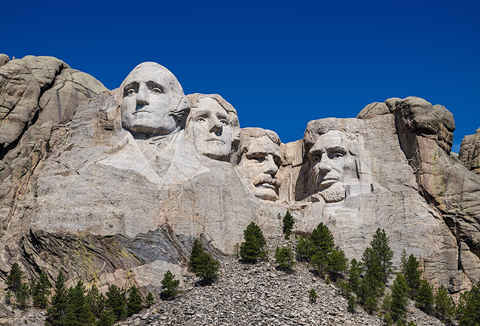Many US Presidents over the years have had to face difficult challenges; war, social upheaval, illness, and injury. It should come as no surprise that several Presidents had various hearing issues although we don’t read about that in our history books.
An Early History of Presidents and Hearing Loss
The United States, like many countries, was forged from the ashes of war. So, our story begins with the first President, George Washington, who emerged from the Revolutionary War with pronounced hearing loss. The constant barrage of cannon fire, musket and pistol fire, and other wartime environments led to hearing problems after his military service that he would carry with him for the rest of his life.
War has not been the only cause of hearing problems in our highest office. Thomas Jefferson, our third President, had hearing loss likely due to his exposure to hunting rifle fire. It caused him much difficulty as he noted in one of his letters: “My hearing is distinct in particular conversation but confused when several voices cross each other…”.
Other Presidents throughout history have also experienced hearing loss from gunfire and recreational noise including Ronald Reagan and Bill Clinton.
As with many people, some Presidents experienced hearing loss due to natural causes such as aging and illness. This was often after leaving office, as in the case of Teddy Roosevelt, who lost hearing in one ear after having an abscess removed. President Herbert Hoover had age-related hearing loss after leaving office. It would make him the first President to use a hearing device that we now take for granted.
Hearing Aids in the Oval Office and Beyond
Electronic hearing aids have been around since the 19th century, but it wasn’t until long after our 31st President, Herbert Hoover left office in 1933 that a President first used a hearing instrument. By then, transistor hearing aids had become common. Hoover used his device to great effect, turning it off when he did not wish to listen to particular speeches.
By the 1980’s, digital hearing aids had started to emerge as a superior technology. It was at this time that Ronald Reagan became the first President to wear hearing aids while still in office. Reagan had experienced hearing loss since 1939, when a .38 caliber pistol was discharged near his right ear while working as an actor on the set of Code of the Secret Service.
When the news reported that the President had begun to wear hearing aids, the media went wild, using this as further evidence to question the aging man’s fitness for office. Reagan turned it around and became an advocate and spokesperson for hearing loss, declaring May as “Better Hearing & Speech Month” in 1986.
Bill Clinton was also fit with hearing aids while in office. His history of noise exposure to loud music, while playing his saxophone in a band, in addition to age-related hearing loss, is believed to have contributed to his hearing loss.
Many former presidents started using hearing aids after their time in office. Richard Nixon, Gerald Ford, Jimmy Carter, and George H. W. Bush all used hearing aids for help with their hearing loss.
Increasing Advocacy for Deaf and Hard of Hearing
No history of Presidents and hearing loss would be complete without discussing the impact that they have had on the rights of those with hearing loss and other physical challenges.
In 1857, President Franklin Pierce signed a piece of legislation establishing the Columbia Institution, a school for deaf and blind children. President Abraham Lincoln signed the charter allowing the school to grant collegiate degrees in 1864. This college would later come to be known as Gallaudet University, the first and only college in the US to offer undergraduate and graduate programs in a completely American Sign Language (ASL) environment.
Lyndon B. Johnson was another President to have an impact on the education of deaf and hard-of-hearing people. In 1964, he signed the National Technical Institute for the Deaf Act. This established the first technological college for deaf and hard-of-hearing people seeking STEM careers.
In 1990, disability rights took a giant leap forward when President George HW Bush signed into law the Americans with Disabilities Act (ADA), increasing accessibility for millions of people. Public venues were now required to provide accommodations, including assistive listening devices, for patrons.
The history of Presidents and hearing loss shows us that they are just like everyone else and not immune to developing hearing loss. Let them be an inspiration for you to get your hearing checked or schedule an appointment for a loved one with one of our hearing experts that will provide an in-home evaluation!

